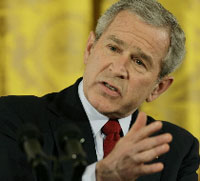Bush seeks cooperation with Russia despite Putin’s harsh remarks
U.S. President George W. Bush, at a press conference held in the White House on Wednesday, insisted that the United States and Russia can work together despite their differences.

Bush said the United States have worked closely on the nuclear issues of Iran, the Democratic People's Republic of Korea (DPRK), as well as counter proliferation issues, Xinhua reports.
"Where we have common interests and we work together on those common interests, we can accomplish important things for the security of our own people as well as the security of the world," Bush said.
His comments at a news conference came after Putin on Saturday accused the United States of attempting to force its will on the world, a view shared by some other countries.
Bush said the two leaders have had their agreements and disagreements, but Putin was still "the same strong-willed person" as when the U.S. president made a now-famous remark about looking into his soul in 2001.
Putin said the United States was making the world a more dangerous place by pursuing policies aimed at making it "one single master."
White House officials have said privately they were surprised by the Russian leader's remarks.
The United States has criticized Russia's record on democracy, and Russia sees the expansion of NATO as a threat to its own security.
Bush said he tried to convince Putin that NATO was a positive influence and that "democracies on your border are good things to have," but the Russian leader disagreed with that assessment.
There were also areas where Russia and the United States could work together, Bush said, calling efforts to convince Iran to abandon its nuclear ambitions one of those "common goals that make sense for both our peoples."
Bush also praised Russia for its part in the nuclear deal with North Korea hammered out this week in Beijing, Reuters reports.
In Moscow on Wednesday, Foreign Minister Sergei Lavrov urged the United States to promote a resolution to the standoff over Iran's nuclear program by showing the same "flexibility" that helped produce North Korea's agreement to halt its atomic programs, the AP report.
The remarks were the latest call for a softer U.S. stance on Iran from Russia, which has repeatedly warned that punishing Iran too harshly for its refusal to suspend uranium enrichment would be counterproductive.
"I will note the efforts by the American side, perhaps in some way against its own will, making reasonable compromises with Pyongyang and by doing so allowing blockage of the six-nation talks to be removed," Interfax quoted Lavrov as saying.
"We would like to see the same flexibility ... in relation to the Iranian nuclear program, where probably something similar could be done -- focusing not on defending the prestige of one's position but on the basis of professional assessments," RIA-Novosti quoted him as saying during a flight from India to Abu Dhabi.
Source: agencies
Prepared by Alexander Timoshik
Pravda.ru
Subscribe to Pravda.Ru Telegram channel, Facebook, RSS!




